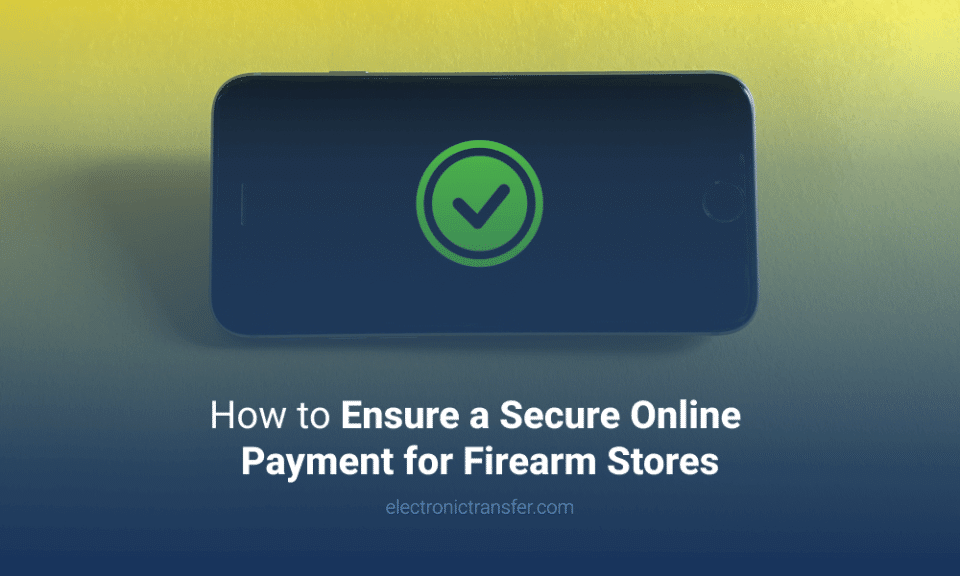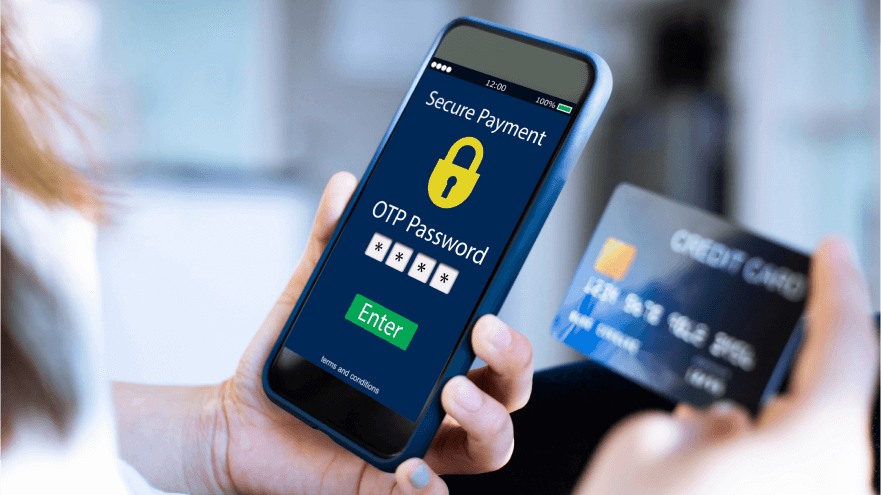How to Ensure a Secure Online Payment for Firearm Stores?
As a gun-friendly company specializing in website payment processing systems we deal with online gun stores owners daily. One common concern our customers share is the challenge of navigating complex terms and ensuring secure online payments for their ventures.

With this article we hope to make the whole process easier to understand. Our goal is to help business owners grasp the basics of secure online payments, giving them peace of mind and confidence in their business operations. Keep on reading!
Online Payment Security: The 5 KeyTerms
There are a few key terms and phrases that will help you better understand payment security. When you familiarize yourself with them, you will already have the basics of what your online gun shop needs to function securely and effectively
1. Payment Gateway
A payment gateway is software that encrypts financial data and authorizes transactions. It communicates with payment processors to allow check out and funds to transfer between buyer and seller.
It is expensive to run such data through your own servers, so in most cases, business owners need a payment gateway built into their hosting platform or connected through a third-party plug-in.
Electronic Transfer, Inc. eProcessing network secure payment gateway allows merchants to accept credit cards and other forms of payment in a secure, real-time environment. It is compatible with various eCommerce shopping carts.
2. SSL and TLS
SSL (Secure Sockets Layer) and TLS (Transport Layer Security) are two major protocols used by websites to encrypt payment data and guarantee secure communication.
Basically they protect the connection between a user’s computer and a website during a transaction.
TLS is the newer protocol and offers stronger encryption compared to SSL but for most website owners, the difference between SSL and TLS is not a major concern. It is more important to obtain one of those from a trusted hosting service.
The SSL/TLS certificate verifies that customer data is encrypted as it travels from the user’s computer to the website’s eCommerce platform.
3. PCI Compliance
PCI compliance means that the rules set by the Payment Card Industry Security Standards Council (PCI SSC) to keep payment data safe are met. This ensures the security of payment data and maintains compliance with industry standards. Non-compliance can lead to hefty fines and potential data breaches.
Different businesses have varying PCI compliance requirements, with major card brands like Visa and Mastercard having their own programs to assess and validate compliance levels.
Ecommerce sellers can check their PCI compliance using a self-assessment form provided by their payment gateway.
4. Tokenization
Tokenization is a process during the online transaction that replaces a credit card number with a unique code or token. This means businesses do not have access to their customers’ full payment information.
By using tokens, you can securely process transactions without storing sensitive data.
Tokenization shifts the responsibility of security to the payment gateway, which already prioritizes security measures.
Tokenization is a crucial part of preserving PCI certification for small businesses.
5. Multi-Factor Authentication
Multi-factor authentication adds an extra layer of security by requiring users to provide additional verification beyond a password. Typically, a code is sent to the user’s phone or email for verification. This method significantly improves security and increases customer trust in the eCommerce process.

Secure Online Payment for Your Customers
With the rise of cyber threats and data breaches, customers are increasingly cautious about sharing their sensitive information online. As a responsible firearms retailer, it’s essential to have robust security measures in place throughout the entire buying journey, from ‘just browsing’ to checkout.
Here are a few requisites to keep in mind when building your online gun store:
Choose a Secure Gun-Friendly Payment Gateway
When selecting a payment gateway, research their security protocols thoroughly. Look for gateways that are PCI DSS compliant, offer advanced fraud detection services, and use advanced encryption methods like TLS 1.2 or higher.
Electronic Transfer Inc. does offer advanced fraud detection services and provide a robust set of tools that includes mechanisms that protect businesses from fraudulent transactions. This helps minimize chargebacks and fraudulent activities.
Choose a Gun-Friendly Payment Processor
When choosing a secure online payment processor for your online gun shop, make sure it can integrate smoothly with your current systems and platform. Look for tools to prevent fraud, support payments across different channels, offer competitive fees, adhere to firearms regulations, and scale as your business grows.
We are a gun-friendly payment processor specializing in providing merchant services and credit card processing. Our range of services is tailored to meet the needs of firearm stores and designed to handle the financial transactions from the customer’s bank to yours.
Website Integration
Proper website integration is crucial. Work closely with your developer to ensure that the payment gateway is seamlessly embedded into your platform’s checkout process. Double-check that your SSL certificate is up-to-date and covers all relevant pages, including the shopping cart and checkout.
Electronic Transfer Inc. platform is designed to seamlessly integrate with your eCommerce website, ensuring a secure payment experience.
Client Registration and Account Setup
You want to secure the registration process with strong password requirements and multi-factor authentication options like SMS or email verification codes. Collect only essential personal information and store it using encryption at rest.
Product Selection and Cart
Make sure that products are not only described correctly with detailed descriptions but have high-quality images, and clear pricing information.
In the shopping cart, allow customers to review and modify their selections before checking out.
Checkout Process
The checkout process is where security takes center stage and usually follows a few steps:
- Cardholder data collection: Here is where cardholder data (credit card number, expiration date, CVV) is collected and secured. Tokenization can be used to replace sensitive data with unique tokens.
- Authentication: Clients receive a one-time code via SMS or email to verify their identity. Systems such as 3D Secure (e.g., Verified by Visa, Mastercard SecureCode) can be implemented for an extra layer of authentication.
- Authorization: At this step, funds are put on hold as the payment gateway communicates with the client’s bank to authorize the transaction.
- Capture: Once the order is ready for shipment the payment gateway transfers the funds from the client’s account to yours.
Order Confirmation
A detailed confirmation email is sent along with the order summary and anticipated shipping date. It’s also a good idea to include discreet packaging options to maintain customer privacy.
Security Measures
Perform regular security audits and penetration testing on your website and systems. Implement a web application firewall (WAF) to protect against common threats like SQL injection and cross-site scripting (XSS) attacks.
Communication and Support
It is important to communicate your payment security measures to buyers.
By advertising the investments made in data protection, such as advanced fraud detection plugins and PCI compliance, you can increase customers’ trust. Offer multiple channels (email, phone, live chat) to customers to report issues or ask questions if they need to.
Compliance and Regulations
Stay up-to-date on relevant laws and regulations governing online firearm sales, such as the Gun Control Act, National Instant Criminal Background Check System (NICS), and state-specific requirements. Ensure your processes align with these guidelines.
Continuous Improvement
Regularly review and update your security measures so you stay on top of the industry’s best practices. You also need to be aware of the latest threats as well as emerging technologies like tokenization vaults or biometric payments so that you can further enhance your customers’ security.
Why educate your customers about security?
While secure payment systems are essential, it’s equally important to educate your customers about the measures you’ve taken to protect their data. Transparency about your security protocols, such as PCI compliance, tokenization, and multi-factor authentication, can build trust and encourage repeat business.
Consider adding a dedicated page or FAQ section on your website to address common security concerns and explain how their sensitive information is handled. Highlighting your commitment to secure transactions not only enhances customer confidence but also sets your business apart in a competitive market.
Wrap Up
From selecting a gun-friendly payment gateway to integrating robust security measures throughout the entire purchase journey, prioritizing secure online payment processes should be a top priority. If you need further assistance or guidance in setting up a secure online payment system for your business, don’t hesitate to reach out to our team of experts at Electronic Transfer, Inc. We’re here to provide comprehensive support and ensure your business operates with the highest levels of security and compliance.


